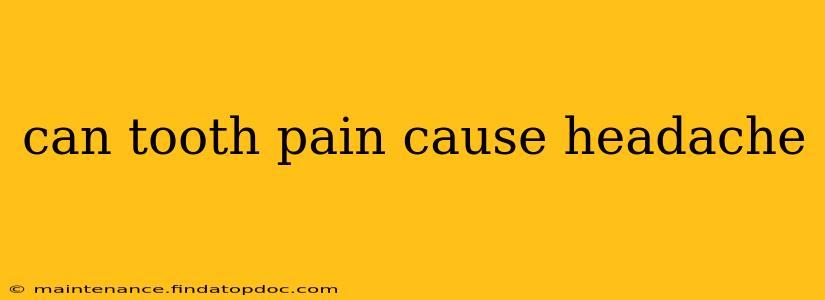Yes, tooth pain can absolutely cause a headache. The connection isn't always immediately obvious, but the intricate network of nerves and blood vessels in your head and face means that pain originating in your teeth can easily radiate to other areas, leading to headaches. This isn't just a minor inconvenience; it's a significant dental concern that requires prompt attention. Let's delve into the details.
How Does Tooth Pain Lead to Headaches?
The pain you experience from a toothache doesn't simply stay localized. Your trigeminal nerve, a major cranial nerve, plays a crucial role. This nerve is responsible for sensation in your face, including your teeth, gums, and jaw. When a tooth is damaged, infected, or otherwise irritated, the trigeminal nerve transmits pain signals. Because this nerve branches extensively throughout your head, the pain can spread, manifesting as a headache, often in the temporal (temple) region or even behind the eyes.
Think of it like ripples in a pond. The initial "splash" (tooth pain) creates expanding waves (pain) that affect surrounding areas. This referred pain is a common phenomenon in the body, and tooth pain to headache referral is a prime example.
What Types of Headaches Can Tooth Pain Cause?
Tooth pain can trigger various types of headaches, including:
-
Tension headaches: These are the most common type of headache, characterized by a dull, aching pain that often feels like a tight band around the head. Tooth pain can easily exacerbate these, making them more intense and persistent.
-
Sinus headaches: While often confused with toothaches, sinus headaches are caused by inflammation or infection in the sinuses. However, severe tooth infections can sometimes mimic sinus pain and lead to headaches. A proper diagnosis is crucial to determine the source.
-
Migraines: In some individuals, severe tooth pain can act as a trigger for migraine headaches. These are characterized by intense throbbing pain, often accompanied by nausea, vomiting, and sensitivity to light and sound.
What Other Symptoms Might Accompany a Toothache-Induced Headache?
Experiencing a headache alongside tooth pain often involves other noticeable symptoms, providing clues to the underlying cause:
-
Jaw pain: Pain in the jaw is a common companion to toothaches, especially if the problem involves the molars or temporomandibular joint (TMJ).
-
Facial swelling: Swelling in the face, particularly around the affected tooth, indicates infection or inflammation.
-
Fever: A high fever points towards a significant infection requiring immediate dental attention.
-
Sensitivity to hot or cold: Sensitivity to temperature changes is a classic sign of tooth problems.
What Should I Do if I Have a Headache and Tooth Pain?
Ignoring a combination of tooth pain and headaches is not advisable. You should:
-
See a dentist: This is the most crucial step. Your dentist can diagnose the cause of your tooth pain and recommend appropriate treatment, relieving both the toothache and the associated headache.
-
Use over-the-counter pain relievers: While not a replacement for professional dental care, medications like ibuprofen or acetaminophen can provide temporary pain relief. Follow the dosage instructions carefully.
-
Apply cold compresses: Cold compresses applied to the affected area can help reduce swelling and pain.
Can dental issues cause headaches that persist even after the tooth problem is solved?
Yes, in some cases, the headache may persist even after successful treatment of the underlying dental issue. This is because inflammation or nerve irritation can take time to fully subside. In such cases, a follow-up appointment with your dentist is recommended, and in some instances, consultation with a neurologist might be helpful to rule out other possible causes of headaches.
Don't suffer in silence. If you're experiencing tooth pain accompanied by headaches, seek professional dental care immediately. Early intervention can prevent the situation from worsening and ensure a quicker recovery.
